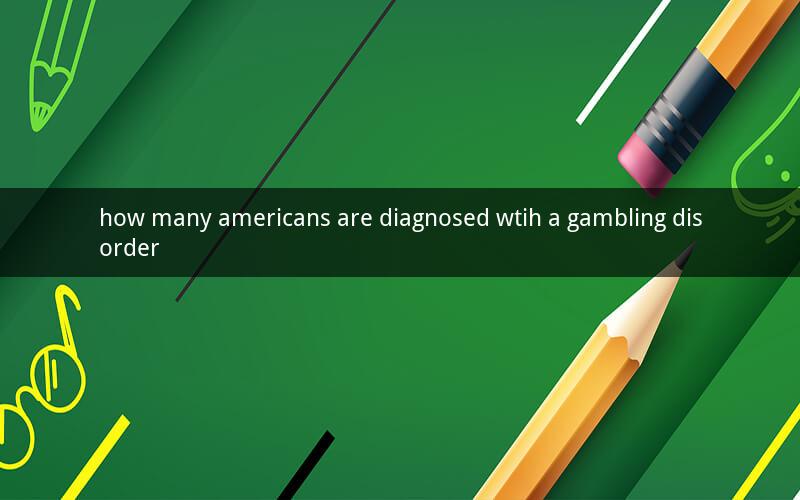
Table of Contents
1. Understanding Gambling Disorder
2. Prevalence of Gambling Disorder in the United States
3. Factors Contributing to the Increase in Gambling Disorder
4. The Impact of Gambling Disorder on Individuals and Society
5. Diagnosis and Treatment of Gambling Disorder
6. Prevention and Education Initiatives
7. Conclusion
1. Understanding Gambling Disorder
Gambling disorder, also known as gambling addiction, is a mental health condition characterized by the inability to control or stop gambling despite negative consequences. Individuals with gambling disorder may experience intense urges to gamble, increased tolerance to gambling, and a preoccupation with gambling activities. This disorder can lead to significant financial, social, and psychological problems.
2. Prevalence of Gambling Disorder in the United States
The prevalence of gambling disorder in the United States varies depending on the source of data. According to the National Survey on Drug Use and Health (NSDUH), approximately 2.1% of American adults had a gambling disorder in the past year. This translates to about 5.2 million adults in the United States. However, these figures may underestimate the true prevalence due to underreporting and the stigma associated with gambling disorder.
3. Factors Contributing to the Increase in Gambling Disorder
Several factors contribute to the increase in gambling disorder in the United States. These include:
- The widespread availability of gambling opportunities, including casinos, sports betting, and online gambling.
- The normalization of gambling as a form of entertainment.
- The economic downturn, which may lead individuals to turn to gambling as a means of coping with financial stress.
- The use of credit cards and other forms of credit to finance gambling activities.
4. The Impact of Gambling Disorder on Individuals and Society
Gambling disorder can have a profound impact on individuals and society. For individuals, the consequences may include:
- Financial problems, such as debt, bankruptcy, and loss of assets.
- Relationship problems, including marital issues, family conflicts, and loss of friendships.
- Mental health issues, such as depression, anxiety, and substance abuse.
- Legal problems, such as arrest for theft or fraud.
Society also bears the brunt of gambling disorder through increased healthcare costs, lost productivity, and the strain on social services.
5. Diagnosis and Treatment of Gambling Disorder
Diagnosis of gambling disorder is based on the criteria outlined in the Diagnostic and Statistical Manual of Mental Disorders (DSM-5). These criteria include experiencing at least four of the following symptoms within a 12-month period:
- Needing to gamble with increasing amounts of money to achieve the desired excitement.
- Repeated unsuccessful efforts to control, cut back, or stop gambling.
- Gambling when feeling distressed, such as feeling sad, anxious, or guilty.
- Spending a significant amount of time obtaining, engaging in, or recovering from gambling activities.
- Risking or losing a significant relationship, job, or educational or career opportunity because of gambling.
- Returning a stolen item or borrowing money to finance gambling.
- Feeling restless or irritable when attempting to cut down or stop gambling.
Treatment for gambling disorder may include:
- Cognitive-behavioral therapy (CBT), which helps individuals identify and change gambling-related thoughts and behaviors.
- Medication, such as antidepressants or mood stabilizers, to address underlying mental health issues.
- Support groups, such as Gamblers Anonymous, which provide peer support and resources for individuals struggling with gambling disorder.
6. Prevention and Education Initiatives
Prevention and education initiatives are crucial in addressing the issue of gambling disorder. These initiatives may include:
- Public awareness campaigns to educate individuals about the risks of gambling disorder.
- Responsible gambling policies and regulations, such as age restrictions and limits on gambling activities.
- Training for healthcare professionals and other service providers on identifying and treating gambling disorder.
- Research to better understand the causes and consequences of gambling disorder.
7. Conclusion
Gambling disorder is a significant public health concern in the United States. Understanding the prevalence, factors contributing to its increase, and the impact on individuals and society is crucial in developing effective prevention and treatment strategies. By promoting awareness, education, and support, we can work towards reducing the burden of gambling disorder on individuals and society.
Questions and Answers
1. What is the prevalence of gambling disorder in the United States?
- Approximately 2.1% of American adults had a gambling disorder in the past year.
2. What are the criteria for diagnosing gambling disorder?
- The DSM-5 outlines criteria, including experiencing at least four of the following symptoms within a 12-month period.
3. What are some factors contributing to the increase in gambling disorder?
- The widespread availability of gambling opportunities, the normalization of gambling, and economic downturns.
4. What are the consequences of gambling disorder for individuals?
- Financial problems, relationship issues, mental health issues, and legal problems.
5. What are some treatment options for gambling disorder?
- Cognitive-behavioral therapy, medication, and support groups.
6. How can individuals seek help for gambling disorder?
- They can seek help from healthcare professionals, support groups, or organizations specializing in gambling disorder.
7. What are some prevention and education initiatives?
- Public awareness campaigns, responsible gambling policies, training for healthcare professionals, and research.
8. How can individuals protect themselves from developing gambling disorder?
- By setting limits on gambling activities, seeking support when needed, and being aware of the risks.
9. What is the role of family and friends in supporting individuals with gambling disorder?
- They can provide emotional support, encourage treatment, and help create a supportive environment.
10. How can society address the issue of gambling disorder?
- By promoting awareness, implementing prevention and education initiatives, and providing resources for individuals struggling with gambling disorder.